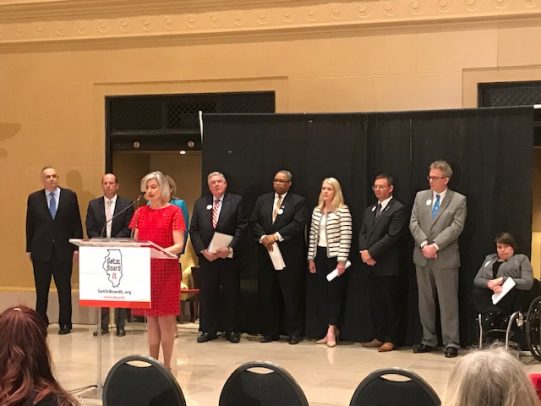A call for public transit support

Illinois transit officials were joined by state leaders and Chicago community stakeholders — including UIC’s Office of Sustainability — at Union Station April 25 to talk about the importance of public transit and to shed light on the challenges within the city and state’s transportation systems, namely chronic underinvestment.
The conference kicked off the Get On Board campaign, which aims to create awareness around a need for consistent and long-term state funding for Illinois’ public transportation systems, the Chicago Transit Authority (CTA), Metra Commuter Rail, Pace Suburban Bus, Amtrak and the Regional Transportation Authority (RTA).
The state is home to the second largest transit network in the U.S., carrying over 2 million riders each day, but the network of systems are old, their operations are expensive and they all come with a long history of disinvestment. The RTA, the financial body for the northeastern transit agencies in Illinois, has $30 billion in unmet reinvestment needs on high-priority projects. Illinois’ downstate agencies have more than $1.5 billion in reinvestment needs.
Local leaders who spoke in support of a statewide bill that could create dependable funding streams for public transit included Cynthia Klein-Banai, UIC associate chancellor for sustainability; Stephanie Acri, mayor of Moline; Rafael Carreira, Riverside Investment & Development executive vice president; Leanne Redden, RTA executive director; Dorval Carter, CTA president; Jim Derwinski, Metra CEO; and Rocky Donahue, executive director of PACE.
Klein-Banai pointed to the environmental benefits of public transit and the impact reinvestment would have on UIC commuters.
“With 15 colleges, a hospital and health sciences center, a growing population of 31,000 students and an ambitious goal to become carbon neutral by 2050, a reliable public transit system is vital to our university’s operations,” Klein-Banai said.
She shared that the Office of Sustainability’s recent UIC transportation survey shows that 27,166 metric tons of carbon dioxide come from commuters who drive to campus alone. A total of 62% of students use CTA and rail.
“Using the survey information and committee input to improve transit to and around campus, results of this survey established that there are three main barriers to biking and transit: cost, proximity and safety,” said Klein-Banai, pointing out that, for this reason, commuters from the South Side and Southern suburbs were more likely to drive.
“A transit system that is accessible and safe will help meet the needs of UIC and its future students, the City of Chicago, and all great cities of the 21st century,” said Klein-Banai. “UIC has access to excellence, and transportation to campus is part of that access that we need to have.”
The RTA’s Regional Transit Strategic Plan calls for an annual investment of $2 billion to $3 billion over the next decade.
“As chairman of the RTA, and a lifelong transit rider, I know firsthand the importance of transit to our region and state,” RTA Chairman Kirk Dillard, adding that public transit affects everyone.
To learn more about the campaign, visit GetonBoardIL.org.
